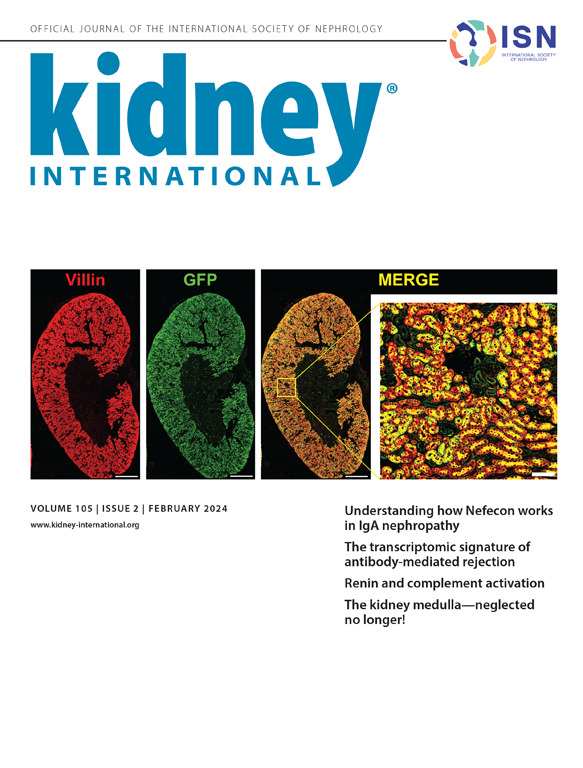Restoration of branched chain amino acid catabolism improves kidney function in preclinical cardiovascular-kidney-metabolic syndrome models.
IF 14.8
1区 医学
Q1 UROLOGY & NEPHROLOGY
引用次数: 0
Abstract
INTRODUCTION Patients with metabolic syndrome and heart failure (HF) often have accompanying kidney dysfunction, which was recently defined as cardiovascular-kidney-metabolic (CKM) syndrome. Prior metabolomics profiling of metabolic syndrome patients identified a plasma branched chain amino acid (BCAA) signature, and BCAAs themselves are elevated in the myocardium of patients with HF, potentially due to a defect in BCAA catabolic breakdown. The rate limiting step of BCAA catabolism is the decarboxylation by the enzyme branched chain ketoacid dehydrogenase (BCKDH), which is negatively regulated by BCKDH kinase (BCKDK or BDK), and BDK inhibitors improve metabolism and heart failure preclinically. METHODS Here, using two pre-clinical CKM models, the hyperphagic ZSF1 obese rat and the uninephrectomized SDT fatty rat with high salt drinking water, we show that BCAA catabolic impairment is associated with and may be causal to CKM. Unbiased proteomic, transcriptomic and metabolomic profiling demonstrated impairment in BCAA catabolism within ZSF1 obese rat kidneys. RESULTS In both CKM animal models, treatment with the BDK inhibitor BT2 improved urine protein content, kidney hypertrophy, and kidney pathology. Furthermore, coadministration of BT2 and the sodium-glucose cotransporter-2 inhibitor empagliflozin demonstrated additive effects to improve kidney parameters, kidney gene expression signatures, and kidney mitochondrial density and function. CONCLUSIONS Our study suggests that in addition to its previously reported effects on metabolism and cardiac function, BDK inhibition may also improve kidney health and therefore could represent a new therapeutic avenue for CKM.支链氨基酸分解代谢的恢复可改善临床前心血管-肾代谢综合征模型的肾功能。
代谢综合征合并心衰(HF)患者常伴有肾功能不全,最近将其定义为心血管-肾-代谢(CKM)综合征。先前代谢综合征患者的代谢组学分析发现了血浆支链氨基酸(BCAA)特征,并且BCAA本身在HF患者心肌中升高,可能是由于BCAA分解代谢分解的缺陷。BCAA分解代谢的限速步骤是支链酮酸脱氢酶(BCKDH)的脱羧,该酶受BCKDH激酶(BCKDK或BDK)的负调控,BDK抑制剂可改善代谢和临床前心力衰竭。方法采用两种临床前CKM模型,即暴饮暴食的ZSF1肥胖大鼠和未切除高盐饮用水的SDT脂肪大鼠,我们发现BCAA分解代谢障碍与CKM有关,并可能是CKM的原因。无偏倚的蛋白质组学、转录组学和代谢组学分析显示,ZSF1肥胖大鼠肾脏内BCAA分解代谢受损。结果在两种CKM动物模型中,BDK抑制剂BT2治疗可改善尿蛋白含量、肾脏肥大和肾脏病理。此外,BT2和钠-葡萄糖共转运蛋白-2抑制剂恩格列净共同给药可改善肾脏参数、肾脏基因表达特征以及肾脏线粒体密度和功能。结论我们的研究表明,除了先前报道的对代谢和心功能的影响外,抑制BDK还可能改善肾脏健康,因此可能是CKM的一种新的治疗途径。
本文章由计算机程序翻译,如有差异,请以英文原文为准。
求助全文
约1分钟内获得全文
求助全文
来源期刊

Kidney international
医学-泌尿学与肾脏学
CiteScore
23.30
自引率
3.10%
发文量
490
审稿时长
3-6 weeks
期刊介绍:
Kidney International (KI), the official journal of the International Society of Nephrology, is led by Dr. Pierre Ronco (Paris, France) and stands as one of nephrology's most cited and esteemed publications worldwide.
KI provides exceptional benefits for both readers and authors, featuring highly cited original articles, focused reviews, cutting-edge imaging techniques, and lively discussions on controversial topics.
The journal is dedicated to kidney research, serving researchers, clinical investigators, and practicing nephrologists.
 求助内容:
求助内容: 应助结果提醒方式:
应助结果提醒方式:


